Interviews, coque iphone pas cher videos,
Metaphysics
Nick Pope – UFOlogist, Author, Journalist
Author, journalist and TV personality Nick Pope ran the British Government’s UFO project for 21 years, at the Ministry of Defense (MoD). In the course of his career he served in a number of different posts, but is best known for work on the MoD’s UFO project. His remit was to investigate sightings, looking for evidence of a potential threat to the defense of the UK, or anything of more general defense and/or scientific interest. Most sightings turned out to be misidentifications of ordinary objects or phenomena, but a small percentage remained unexplained. Nick Pope was initially skeptical, but his official research and investigations convinced him that whatever the true nature of the sightings that remained unexplained, the UFO phenomenon raised important defense, national security and air safety issues, as well as being worth looking at from a scientific perspective. He was particularly interested in cases where the witnesses were pilots, or where UFOs were tracked on radar. coque iphone 6
Moon Voids – What Are They?
MOON VOIDS by Sara E. coque iphone 8 Morrow We all know the legends about werewolves howling on the full moon. Yet, little is known of the metaphysical side of the journey that takes the moon around the earth approximately every 27 days that affects our lives, daily. In its orbit, the moon visits a different zodiac sign approximately every 2½ days. But it’s not always a smooth, even transition between them and there are times when the moon is not within a zodiac’s parameters, therefore it’s said to be in a ‘void’ period. Now consider our lives like a book, the narrator and writer being the moon. Each zodiac sign is like a chapter the moon moves through, telling the story as we go along. Like each new chapter, and story, our life changes with the moon’s journey along with the events and emotions involved. coque iphone 2019 We’re not always consciously aware of these changes, as the moon is connected to our subconscious, which feels the shift. As the moon moves through the zodiac it also makes contact with the planets. These planets inform us of how our story will play out, emotionally and physically. There is always a pause at the end of the story. When the moon is in that phase, we call it a moon void. Understanding the ‘Void’ During this period, often we feel disconnected. Unforeseen, surprising results can arise. Avoid being involved in concerns beyond your spiritual center. coque iphone x Delays and frustration are common. ‘Voids’ are created because these lunar ‘chapters’ aren’t the same length. Some take the whole 2 ½ days, but others are much shorter. The void is thought of as the last moment it makes contact in a sign until the next moment it makes contact in the new sign. An easy way to understand it is: Let’s say the moon is in Virgo from Monday at 12 PM until it leaves Virgo Wednesday at 12 PM, on its way to Libra. But it won’t officially reach Libra until Thursday at 12 AM. Technically, the moon is “in void” for that 12 hours. There’s no complete and undisputable reason for such pauses on the moon’s journey. We can theorize all we want — maybe the next chapter will be intense and we need prep time? Maybe we need time to reflect on the last? Regardless, the moon takes her sweet time in travel and we’re along for the ride. Navigating the ‘Void’ We have learned the void of course period is when the moon is between two signs. But it’s not in some black hole or nowhere to be found. It’s always in flux between one sign or another but before it officially crosses paths with its impending new planet, there’s a period where things can get energetically out of whack. coque iphone 6 It’s important to remember moon voids when making big decisions and considering life’s big questions you may want answered in a certain way. coque iphone pas cher When the moon is in void – the answer to your question is that nothing is going to happen. coque iphone xs max For example, if a person asked – am I going to get that job? The answer would be, likely not because nothing is going to happen. But if it was more – am I going to get fired? Then, the answer of nothing will happen is perceived as a better option. The key – keep in mind the phrase or notion – nothing is going to happen — and use it to your desired outcome. Things suggested to avoid: signing contracts, close a deal, start a project, or anything else you want concrete results from, as they will be plagued with problems. But – if you want to drop some bad news, fewer repercussions will follow. ‘How To’ Guide For most of us, to have the know how, the time and the data to track moon voids is nearly impossible.
Richard – Psychic & Astrologer
Psychics can be healers with a vision. In today’s world many people are seeking answers. Over the years I have given readings to people from all walks of life. Everyone’s life is their spiritual path. It is our commitment to what we are doing that adds meaning to our lives and allows us to grow. The search for a good psychic is also a reflection of ones sincerity. coque iphone 8 I find when people come to me with a genuine desire to understand, it enhances the reading . Psychics are a mirror. I first learned of my psychic ability when I was 9 years old. It was fascination with tarot cards and symbolism that led me to connect with spirit. I remember trying séances in the basement with friends and reading tarot cards for my grandmother. At age 15, my cousins fiancé had me attend a psychometry class during which we all exchanged jewelry in a darkened room. coque iphone 6 I sat there holding a ring and started describing Bermuda to a complete stranger. I knew he/she had bought the ring there while on a honeymoon. I was completely accurate and have never been to Bermuda to this day! As time passed I studied astrology, tarot and took college classes in Greek Mythology and English Literature. This foundation provided an understanding of the cycles and patterns in life as every myth has a core pattern, whether it is death and rebirth or the path to individuation. Simple archetypes such as Mother or Father exist in our lives naturally. For me being a psychic is a mystical path. It is a transcending of the senses so that seeing and hearing become one highly attuned faculty. Meditation is a great way to experience the inner core of who we are. Mystics always speak of the higher worlds that can be found in meditation. A genuine reading is a healing providing the opportunity to become more conscious. Psychics can work with you on many levels. They can offer insight on relationships and why something happened because they see life as multidimensional and are able to view multiple lifetimes. Some may call this process Karma. God or the Self is the point of reference. It is always beneficial to choose a psychic that understands these different levels and can inject positive energy into your life. Recently a girl returned for another reading and said that she had no idea who the person was that I had mentioned in her previous reading. I had given her the name Nick, a man from the South who had blonde hair. coque iphone 2019 soldes She revealed that a year and 1,500 miles later she had met Nick and had begun dating him. At that point I looked up and said, “He is working at a government building in Boston.” Her jaw dropped. On another occasion, a client called me to share she been diagnosed with pancreatitis. I said, “No. You don’t have pancreatitis, you need to go back ASAP.” Two days later she called to tell me her doctor had run the tests again and was able to confirm that there was NO pancreatitis. A few months ago, a client of 13 years included me in the Foreward of her book. She also included my predictions, which came to pass. coque iphone
“During a reading with psychic, Richard Wendt of Peabody, MA (www.readingsbyrichard.com) in 2009, he told us that he “sees” us moving from California to Ohio, living by the Ohio River, most likely Cincinnati and being very happy. I’m thinking, “of all places …..Ohio?? Cincinnati?? What the heck?? So far Richards’s readings have been so precise and all the predictions that he had made to us, came true. coque iphone xr Almost 2 years later, we couldn’t be happier and plan on living here for a long time, if not for the rest of our lives in Cincinnati.”
Psychics differ in style. I like the intimacy and confidentiality of a one-on-one private reading which offers a moment that is only for you. I feel something is lost in the process of a group reading, not to mention the sharing of personal information in public. – Richard About Richard Richard has been a gifted psychic practitioner for 30 years. He combines Tarot, Astrology, Clairvoyance and Clairaudience to give you exact details that will help you turn the corner in love, prosperity and business. During a session his powerful psychic skills can connect you with a loved one who has passed on. He has consulted for business owners, missing persons and legal cases, and predicted many weddings to which he ended up invited! Richard produced and moderated a weekly “call in” psychic radio program called, “Coast Revelations” on WKOST and has been quoted in major publications. He reads for celebrities, government officials and everyday people.
Even the Moon Needs a Day Off Sometimes
by Sara E. Morrow MOON VOIDS We all know the legends about werewolves howling on the full moon. Yet, little is known of the metaphysical side of the journey that takes the moon around the earth approximately every 27 days that affects our lives, daily. In its orbit, the moon visits a different zodiac sign approximately every 2 ½ days. But it’s not always a smooth, even transition between them and there are times when the moon is not within a zodiac’s parameters, therefore it’s said to be in a ‘void’ period. Now consider our lives like a book, the narrator and writer being the moon. Each zodiac sign is like a chapter the moon moves through, telling the story as we go along. coque iphone xs max Like each new chapter, and story, our life changes with the moon’s journey along with the events and emotions involved. We’re not always consciously aware of these changes, as the moon is connected to our subconscious, which feels the shift. As the moon moves through the zodiac it also makes contact with the planets. These planets inform us of how our story will play out, emotionally and physically. There is always a pause at the end of the story. coque iphone 8 When the moon is in that phase, we call it a moon void. coque iphone Understanding the ‘Void’ During this period, often we feel disconnected. Unforeseen, surprising results can arise. Avoid being involved in concerns beyond your spiritual center. Delays and frustration are common. ‘Voids’ are created because these lunar ‘chapters’ aren’t the same length. Some take the whole 2 ½ days, but others are much shorter. The void is thought of as the last moment it makes contact in a sign until the next moment it makes contact in the new sign. An easy way to understand it is: Let’s say the moon is in Virgo from Monday at 12 PM until it leaves Virgo Wednesday at 12 PM, on its way to Libra. coque iphone 8 But it won’t officially reach Libra until Thursday at 12 AM. Technically, the moon is “in void” for that 12 hours. acheter coque iphone There’s no complete and undisputable reason for such pauses on the moon’s journey. We can theorize all we want — maybe the next chapter will be intense and we need prep time? Maybe we need time to reflect on the last? Regardless, the moon takes her sweet time in travel and we’re along for the ride. coque iphone pas cher Navigating the ‘Void’ We have learned the void of course period is when the moon is between two signs. But it’s not in some black hole or nowhere to be found. It’s always in flux between one sign or another but before it officially crosses paths with its impending new planet, there’s a period where things can get energetically out of whack. It’s important to remember moon voids when making big decisions and considering life’s big questions you may want answered in a certain way. When the moon is in void – the answer to your question is that nothing is going to happen. coque iphone 6 For example, if a person asked – am I going to get that job? The answer would be, likely not because nothing is going to happen. But if it was more – am I going to get fired? Then, the answer of nothing will happen is perceived as a better option. The key – keep in mind the phrase or notion – nothing is going to happen — and use it to your desired outcome. Things suggested to avoid: signing contracts, close a deal, start a project, or anything else you want concrete results from, as they will be plagued with problems. But – if you want to drop some bad news, fewer repercussions will follow. ‘How To’ Guide For most of us, to have the know how, the time and the data to track moon voids is nearly impossible.
Super Full Moon with Retrograde Mercury and Neptune
By: Rahelio, June 18, 2014 at 10:44am I thought i would repost this article and make it a Note so it can be more easilly accessed as it’s implications are reverberating through this Mercury retrograde period.  It’s full moon tonight (June 12th) and this one is called a Honey Moon because of its color. This one is also a super moon which means the moon is making a perigee or close approach to the earth, and therefore its appearance is larger when rising or setting, and its influence has a stronger affect on the oceans tides. It can also create extreme weather conditions and have a strong affect on the emotional reactions of people and circumstances over the next few weeks. On June 7th Mercury turned retrograde at 3 degrees of the sign Cancer while making a hard aspect to the planet Saturn in Scorpio. Saturn is a somber influence so creates a serious turn of mind. Decisions have or will be made to put things in proper order. This can bring up difficult realizations regarding what needs to be let go of or be redefined to support the needs of the moment. coque iphone Mercury will remain in retrograde motion until the 1st of July. Mercury in Cancer relates to personal / emotional needs, and issues linked to one’s home, family and security come to the forefront. For some this can be just the need to rearrange furniture or take care of necessary maintenance around the house and yard and tying up loose ends for whatever needs to come to completion. Since Mercury rules Gemini communication issues will require thoughtful reconsiderations as misspoken words or thoughts can create unnecessary complications, misunderstandings or separations. It is important to be clear with what decisions are being made at this time as unforeseen circumstances may require a change in plans. This is not a good time to make legal commitments, sign contracts or start a new business as positive momentum will be lacking. coque iphone 2019 pas cher It is a good time to lay the ground work and catch up with things you have been meaning to do. So Neptune has also turned retrograde on the 9th of June giving an added emphasis to Mercury’s turn of direction. Neptune’s influence can relate to our dreams and inspiration, and can connect us to our faith in the spiritual. But it can also be seen in how we can become disillusioned when we have unreal expectations for things that are out of reach and based on wishful thinking. This can be a real issue for those who suffer from depression or are facing challenging circumstances. These retrograde influences can make us reconsider what our priorities are and get real with what are the facts defining our reality at this time. Especially since Venus, goddess of love, is in direct opposition to Saturn at this time. Quite often work priorities and responsibilities or dissatisfaction with how things have been going can take center stage as Venus love of pleasure has to find practical expression for her to be in harmony with her relations. coque iphone soldes This can be a time of separation for some or a need to redefine the rules of engagement to allow for harmony and love to flow. And with Mars involved in the past grand cross planetary pattern and recent eclipses its turning direct has been quite a trigger for change and challenges as the aggressive energy that comes with it has brought up hostilities and possibilities for war in to many places for me to mention. soldes coque iphone pas cher Mars also completed its square aspect with Pluto on June 14th which adds to the impact of this full moon and greater disruption for those living in places of hostility like whats happening in Iraq. The direct motion of Mars on May 20th also corresponded with the fire for us here in Sedona. On the 25th of June Mars will come into opposition to Uranus with this aspect being a trigger of the before mentioned grand cross and eclipse energies. This is also a very volatile combination as Uranus energy is like the lightning bolt, it brings awakening and excitement but can burn your house down or bring with it accidents and reckless behavior. Uranus as ruler of Aquarius is a revolutionary energy. vente de coque iphone It is a quickening energy for all that is new and brings forth the potential for enlightenment and liberation from limiting conditions. Its a good time to focus on inner peace and find harmonious creative outlets for this unpredictable and volatile energy. This time calls for us to be strong, and do what we need to do in order to be happy and live the life we choose. coque iphone 6 It’s just important to handle the energy of these Mars to Pluto and Uranus hard aspects with care so as to use this energy constructively to recreate and regenerate ourselves and our reality in a good way. So this is another reminder to follow your heart and put your life in order as the Sagittarius full moon invites us to expand our view on life and see the possibilities ahead of us if we first lay the groundwork to allow it to be made manifest. Sagitarrius as a fire sign brings creativity and a need for freedom of expression. It reminds us not to over-extend ourselves in impractical optimism but to intuit what is right for us and know what can lead to greater opportunities inspite of the retrograde Mercury. And the ruler of Sagittarius is Jupiter also in the sign of Cancer, so focus on what supports your home, family and community; and issues around security. This is where support can come or where one needs to focused if you are feeling vulnerable or your home and family life is in upheaval. The influence of a full moon is usually about 2 weeks but with all that comes with this one the ongoing implications may be long lasting… May you ride this wave in beauty… and in harmony and balance with all your relations…
It’s full moon tonight (June 12th) and this one is called a Honey Moon because of its color. This one is also a super moon which means the moon is making a perigee or close approach to the earth, and therefore its appearance is larger when rising or setting, and its influence has a stronger affect on the oceans tides. It can also create extreme weather conditions and have a strong affect on the emotional reactions of people and circumstances over the next few weeks. On June 7th Mercury turned retrograde at 3 degrees of the sign Cancer while making a hard aspect to the planet Saturn in Scorpio. Saturn is a somber influence so creates a serious turn of mind. Decisions have or will be made to put things in proper order. This can bring up difficult realizations regarding what needs to be let go of or be redefined to support the needs of the moment. coque iphone Mercury will remain in retrograde motion until the 1st of July. Mercury in Cancer relates to personal / emotional needs, and issues linked to one’s home, family and security come to the forefront. For some this can be just the need to rearrange furniture or take care of necessary maintenance around the house and yard and tying up loose ends for whatever needs to come to completion. Since Mercury rules Gemini communication issues will require thoughtful reconsiderations as misspoken words or thoughts can create unnecessary complications, misunderstandings or separations. It is important to be clear with what decisions are being made at this time as unforeseen circumstances may require a change in plans. This is not a good time to make legal commitments, sign contracts or start a new business as positive momentum will be lacking. coque iphone 2019 pas cher It is a good time to lay the ground work and catch up with things you have been meaning to do. So Neptune has also turned retrograde on the 9th of June giving an added emphasis to Mercury’s turn of direction. Neptune’s influence can relate to our dreams and inspiration, and can connect us to our faith in the spiritual. But it can also be seen in how we can become disillusioned when we have unreal expectations for things that are out of reach and based on wishful thinking. This can be a real issue for those who suffer from depression or are facing challenging circumstances. These retrograde influences can make us reconsider what our priorities are and get real with what are the facts defining our reality at this time. Especially since Venus, goddess of love, is in direct opposition to Saturn at this time. Quite often work priorities and responsibilities or dissatisfaction with how things have been going can take center stage as Venus love of pleasure has to find practical expression for her to be in harmony with her relations. coque iphone soldes This can be a time of separation for some or a need to redefine the rules of engagement to allow for harmony and love to flow. And with Mars involved in the past grand cross planetary pattern and recent eclipses its turning direct has been quite a trigger for change and challenges as the aggressive energy that comes with it has brought up hostilities and possibilities for war in to many places for me to mention. soldes coque iphone pas cher Mars also completed its square aspect with Pluto on June 14th which adds to the impact of this full moon and greater disruption for those living in places of hostility like whats happening in Iraq. The direct motion of Mars on May 20th also corresponded with the fire for us here in Sedona. On the 25th of June Mars will come into opposition to Uranus with this aspect being a trigger of the before mentioned grand cross and eclipse energies. This is also a very volatile combination as Uranus energy is like the lightning bolt, it brings awakening and excitement but can burn your house down or bring with it accidents and reckless behavior. Uranus as ruler of Aquarius is a revolutionary energy. vente de coque iphone It is a quickening energy for all that is new and brings forth the potential for enlightenment and liberation from limiting conditions. Its a good time to focus on inner peace and find harmonious creative outlets for this unpredictable and volatile energy. This time calls for us to be strong, and do what we need to do in order to be happy and live the life we choose. coque iphone 6 It’s just important to handle the energy of these Mars to Pluto and Uranus hard aspects with care so as to use this energy constructively to recreate and regenerate ourselves and our reality in a good way. So this is another reminder to follow your heart and put your life in order as the Sagittarius full moon invites us to expand our view on life and see the possibilities ahead of us if we first lay the groundwork to allow it to be made manifest. Sagitarrius as a fire sign brings creativity and a need for freedom of expression. It reminds us not to over-extend ourselves in impractical optimism but to intuit what is right for us and know what can lead to greater opportunities inspite of the retrograde Mercury. And the ruler of Sagittarius is Jupiter also in the sign of Cancer, so focus on what supports your home, family and community; and issues around security. This is where support can come or where one needs to focused if you are feeling vulnerable or your home and family life is in upheaval. The influence of a full moon is usually about 2 weeks but with all that comes with this one the ongoing implications may be long lasting… May you ride this wave in beauty… and in harmony and balance with all your relations…
The Fermi Paradox – Are We Alone?
Everyone feels something when they’re in a really good starry place on a really good starry night and they look up and see this:
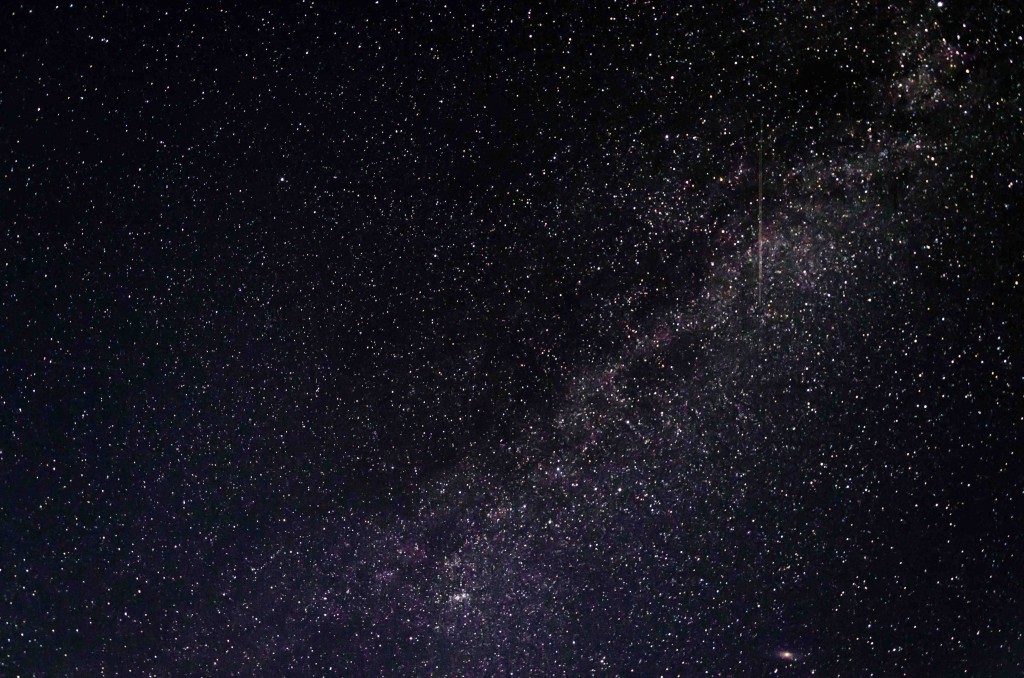

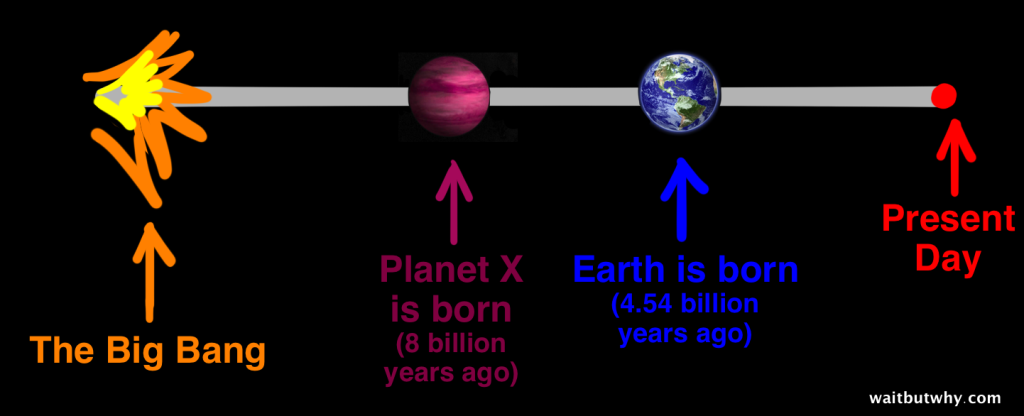
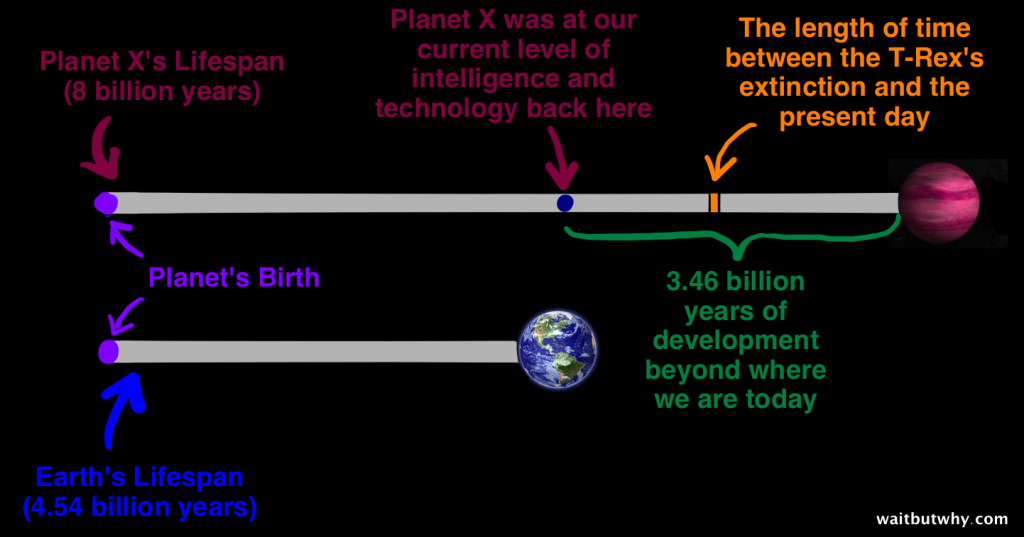
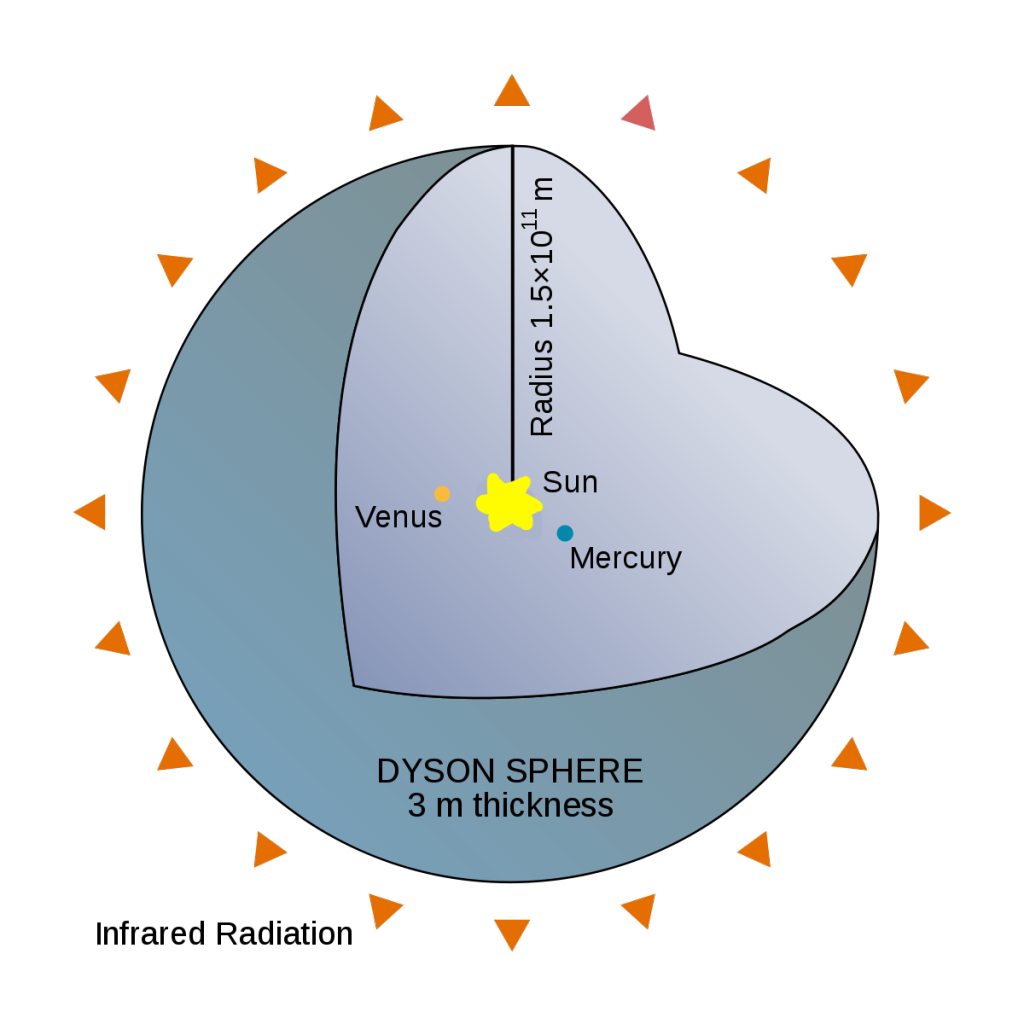
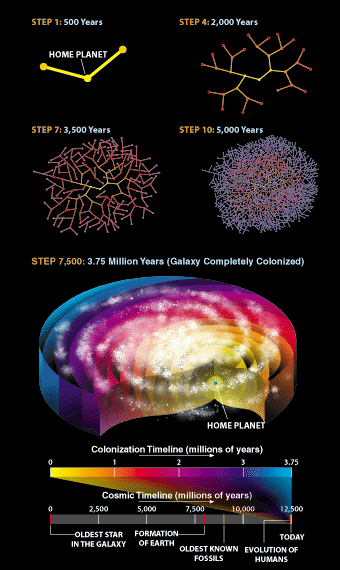
So where is everybody?
Explanation Group 1: There are no signs of higher (Type II and III) civilizations because there are no higher civilizations in existence.
Those who subscribe to Group 1 explanations point to something called the non-exclusivity problem, which rebuffs any theory that says, “There are higher civilizations, but none of them have made any kind of contact with us because they all _____.” Group 1 people look at the math, which says there should be so many thousands (or millions) of higher civilizations, that at least one of them would be an exception to the rule. Even if a theory held for 99.99 percent of higher civilizations, the other .01 percent would behave differently and we’d become aware of their existence. Therefore, say Group 1 explanations, it must be that there are no super-advanced civilizations. And since the math suggests that there are thousands of them just in our own galaxy, something else must be going on. This something else is called The Great Filter. The Great Filter theory says that at some point from pre-life to Type III intelligence, there’s a wall that all or nearly all attempts at life hit. There’s some stage in that long evolutionary process that is extremely unlikely or impossible for life to get beyond. That stage is The Great Filter.
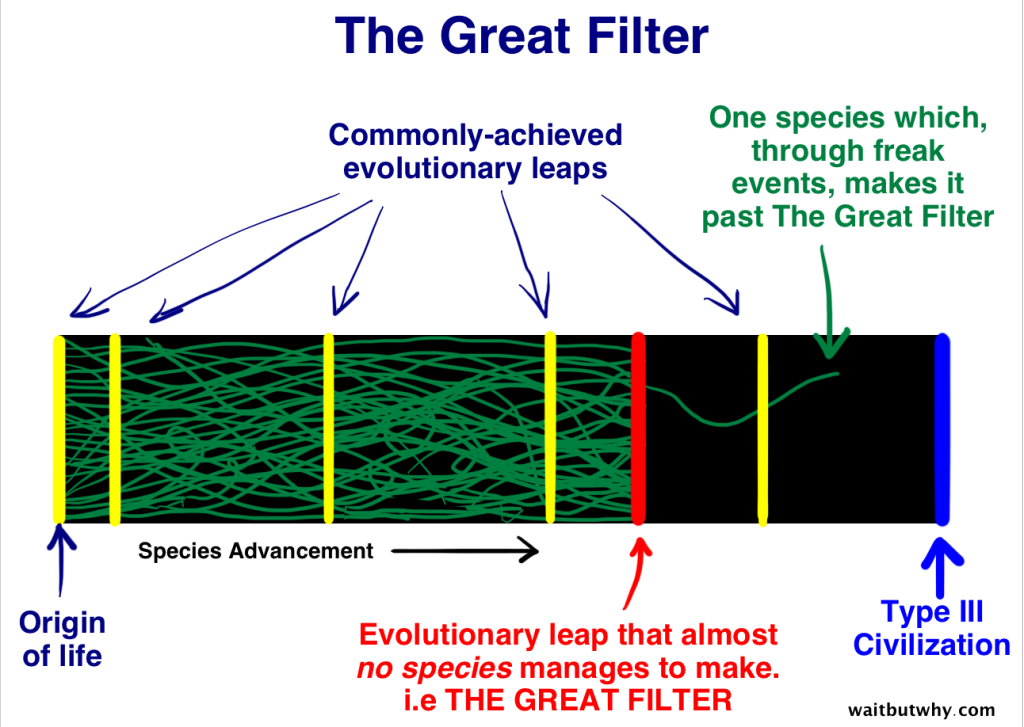
1. We’re Rare (The Great Filter is Behind Us)
One hope we have is that The Great Filter is behind us — we managed to surpass it, which would mean it’s extremely rare for life to make it to our level of intelligence. The diagram below shows only two species making it past, and we’re one of them. soldes coque iphone
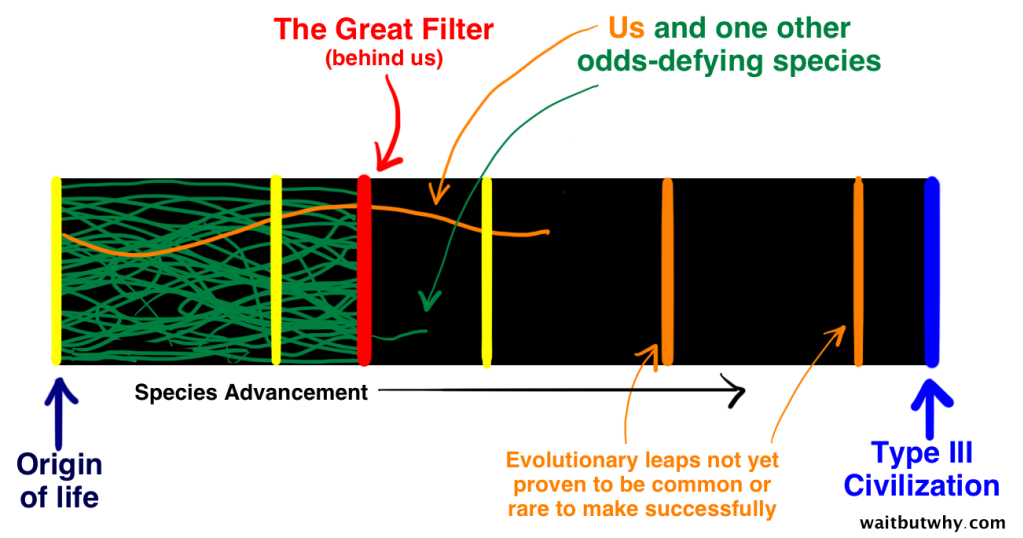
2. We’re the First
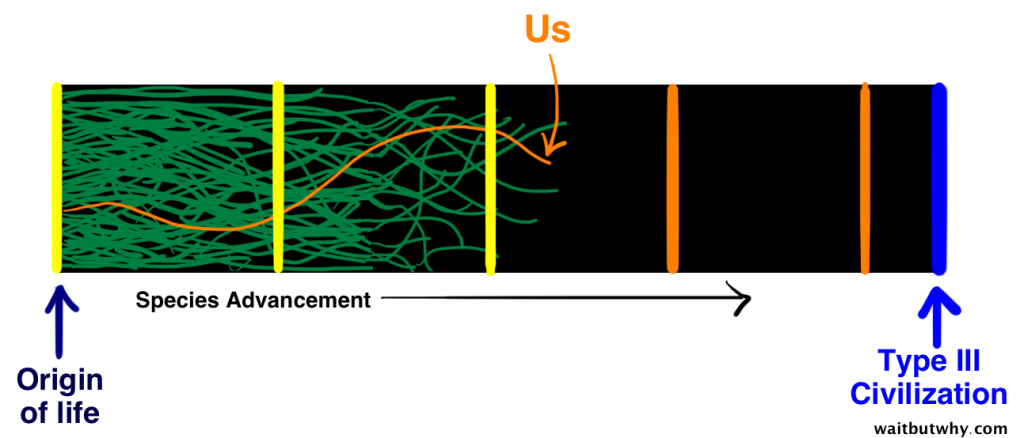
3. We’re Fucked (The Great Filter is Ahead of Us)
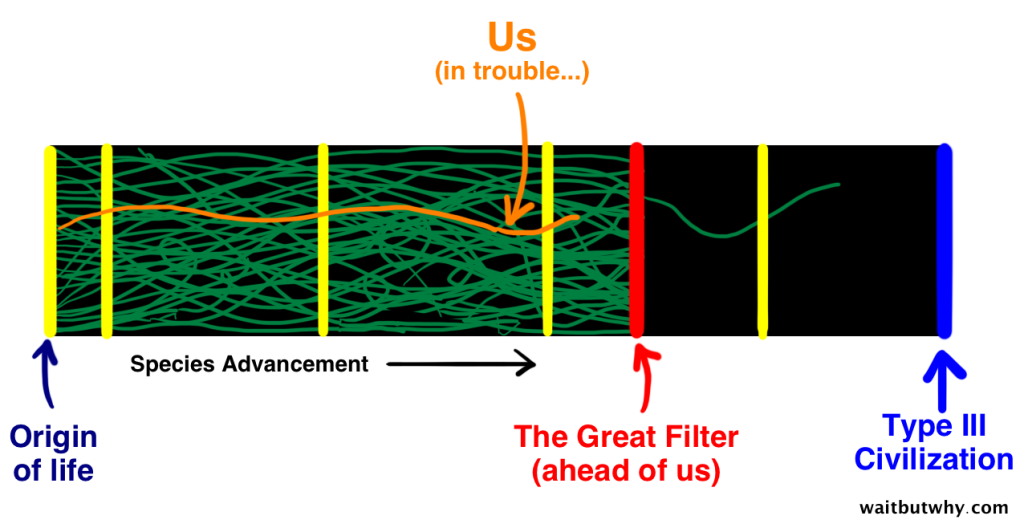
Explanation Group 2: Type II and III intelligent civilizations are out there — and there are logical reasons why we might not have heard from them.
Group 2 explanations get rid of any notion that we’re rare or special or the first at anything — on the contrary, they believe in the Mediocrity Principle, whose starting point is that there is nothing unusual or rare about our galaxy, solar system, planet, or level of intelligence, until evidence proves otherwise. They’re also much less quick to assume that the lack of evidence of higher intelligence beings is evidence of their nonexistence — emphasizing the fact that our search for signals stretches only about 100 light years away from us (0.1 percent across the galaxy) and suggesting a number of possible explanations. Here are 10: Possibility 1) Super-intelligent life could very well have already visited Earth, but before we were here. In the scheme of things, sentient humans have only been around for about 50,000, a little blip of time — if contact happened before then, it might have made some ducks flip out and run into the water and that’s it. Further, recorded history only goes back 5,500 years — a group of ancient hunter-gatherer tribes may have experienced some crazy alien shit, but they had no good way to tell anyone in the future about it. Possibility 2) The galaxy has been colonized, but we just live in some desolate rural area of the galaxy. The Americas may have been colonized by Europeans long before anyone in a small Inuit tribe in far northern Canada realized it had happened. There could be an urbanization component to the interstellar dwellings of higher species, in which all the neighboring solar systems in a certain area are colonized and in communication, and it would be impractical and purposeless for anyone to deal with coming all the way out to the random part of the spiral where we live. Possibility 3) The entire concept of physical colonization is a hilariously backward concept to a more advanced species. Remember the picture of the Type II Civilization above with the sphere around their star? With all that energy, they might have created a perfect environment for themselves that satisfies their every need. They might have crazy-advanced ways of reducing their need for resources and zero interest in leaving their happy utopia to explore the cold, empty, undeveloped universe. An even more advanced civilization might view the entire physical world as a horribly primitive place, having long ago conquered their own biology and uploaded their brains to a virtual reality, eternal-life paradise. Living in the physical world of biology, mortality, wants, and needs might seem to them the way we view primitive ocean species living in the frigid, dark sea. FYI, thinking about another life form having bested mortality makes me incredibly jealous and upset. Possibility 4) There are scary predator civilizations out there, and most intelligent life knows better than to broadcast any outgoing signals and advertise their location. This is an unpleasant concept and would help explain the lack of any signals being received by the SETI satellites. It also means that we might be the super naive newbies who are being unbelievably stupid and risky by ever broadcasting outward signals. There’s a debate going on currently about whether we should engage in METI (Messaging to Extraterrestrial Intelligence — the reverse of SETI) or not, and most people say we should not. Stephen Hawking warns, “If aliens visit us, the outcome would be much as when Columbus landed in America, which didn’t turn out well for the Native Americans.” Even Carl Sagan (a general believer that any civilization advanced enough for interstellar travel would be altruistic, not hostile) called the practice of METI “deeply unwise and immature,” and recommended that “the newest children in a strange and uncertain cosmos should listen quietly for a long time, patiently learning about the universe and comparing notes, before shouting into an unknown jungle that we do not understand.” Scary.[2] Possibility 5) There’s only one instance of higher-intelligent life — a “superpredator” civilization (like humans are here on Earth) — who isfar more advanced than everyone else and keeps it that way by exterminating any intelligent civilization once they get past a certain level. This would suck. The way it might work is that it’s an inefficient use of resources to exterminate all emerging intelligences, maybe because most die out on their own. But past a certain point, the super beings make their move — because to them, an emerging intelligent species becomes like a virus as it starts to grow and spread. This theory suggests that whoever was the first in the galaxy to reach intelligence won, and now no one else has a chance. This would explain the lack of activity out there because it would keep the number of super-intelligent civilizations to just one. Possibility 6) There’s plenty of activity and noise out there, but our technology is too primitive and we’re listening for the wrong things.Like walking into a modern-day office building, turning on a walkie-talkie, and when you hear no activity (which of course you wouldn’t hear because everyone’s texting, not using walkie-talkies), determining that the building must be empty. Or maybe, as Carl Sagan has pointed out, it could be that our minds work exponentially faster or slower than another form of intelligence out there — e.g. it takes them 12 years to say “Hello,” and when we hear that communication, it just sounds like white noise to us. Possibility 7) We are receiving contact from other intelligent life, but the government is hiding it. This is an idiotic theory, but I had to mention it because it’s talked about so much. Possibility 8) Higher civilizations are aware of us and observing us (AKA the “Zoo Hypothesis”). As far as we know, super-intelligent civilizations exist in a tightly-regulated galaxy, and our Earth is treated like part of a vast and protected national park, with a strict “Look but don’t touch” rule for planets like ours. coque iphone 6 We wouldn’t notice them, because if a far smarter species wanted to observe us, it would know how to easily do so without us noticing. Maybe there’s a rule similar to the Star Trek’s “Prime Directive” which prohibits super-intelligent beings from making any open contact with lesser species like us or revealing themselves in any way, until the lesser species has reached a certain level of intelligence. Possibility 9) Higher civilizations are here, all around us. But we’re too primitive to perceive them. Michio Kaku sums it up like this: Let’s say we have an ant hill in the middle of the forest. And right next to the ant hill, they’re building a ten-lane super-highway. And the question is “Would the ants be able to understand what a ten-lane super-highway is? Would the ants be able to understand the technology and the intentions of the beings building the highway next to them? So it’s not that we can’t pick up the signals from Planet X using our technology, it’s that we can’t even comprehend what the beings from Planet X are or what they’re trying to do. It’s so beyond us that even if they really wanted to enlighten us, it would be like trying to teach ants about the internet. Along those lines, this may also be an answer to “Well if there are so many fancy Type III Civilizations, why haven’t they contacted us yet?” To answer that, let’s ask ourselves — when Pizarro made his way into Peru, did he stop for a while at an anthill to try to communicate? Was he magnanimous, trying to help the ants in the anthill? Did he become hostile and slow his original mission down in order to smash the anthill apart? Or was the anthill of complete and utter and eternal irrelevance to Pizarro? That might be our situation here. Possibility 10) We’re completely wrong about our reality. There are a lot of ways we could just be totally off with everything we think. The universe might appear one way and be something else entirely, like a hologram. Or maybe we’rethe aliens and we were planted here as an experiment or as a form of fertilizer. There’s even a chance that we’re all part of a computer simulation by some researcher from another world, and other forms of life simply weren’t programmed into the simulation.